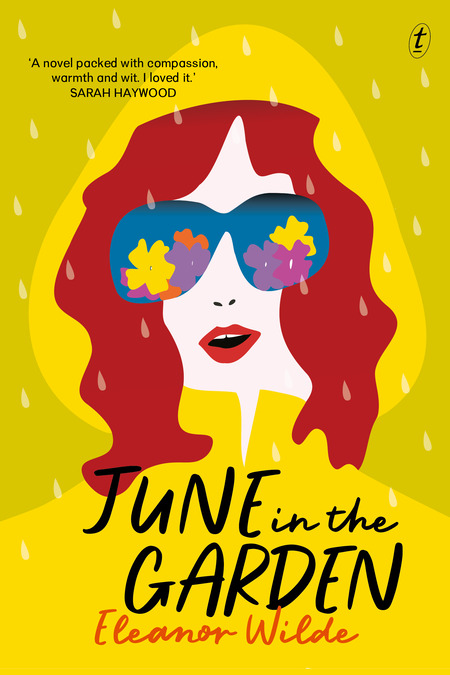(courtesy Text Publishing)
We all crave a place to belong.
There’s an innate drive to find our tribe, our people which defines all of us, with the presence of whatever we know as family enriching us and its absence impoverishing and isolating in ways innumerable.
In short, we need companions in life, and so, it makes perfect sense that June, the eponymous protagonist of Eleanor Wilde’s vibrantly affecting debut novel, June in the Garden, would seek out her biological father, whom she’s never met and only knows from a long-buried photo, after her mother unexpectedly dies.
June is very much a creature of habit, her life filled with meals at precisely defined and unwavering points, particular TV programs at heart and a love of gardening so enmeshed in who she is that she can name every flower species and knows precisely what should be planted when.
She doesn’t want to leave her home in Edinburgh but with her father far away in London with a new family, she doesn’t have much choice but to embark on a huge learning curve and get on a bus that doesn’t take her to her well-worn job at Marks & Spencer but down across a country she’s never seen to a city she doesn’t know full of people who test her limited understanding of how people work.
While it’s never explicitly stated, June is on the autism spectrum, and while her mother has worked hard to get aware of how she should socially interact, plunging into a city full of unpredictable people is a massively challenging undertaking.
The world tilts and I hear someone scream. I feel a warmth inside my veins and a tightness closing in around my body.. A crushing, suffocating tightness. Then, nothing.
I blink once, twice, and see Mother’s urn still sitting in the green armchair.
Aileen is gone, and the door is wide open.
But June embarks on it nonetheless and as June in the Garden gathers pace, both on the trans-country bus and the Tube, and without, you come to admire how brave June really is.
How many of us would upend everything just to find the people we think will be our people?
June is driven in part by necessity, but also by a innate certainty that since her father is her father, he will, of course, take her in and make her part of his family; life isn’t that simple alas but in June’s world it is, and so, while we might think twice about turning up to meet someone to whom we might be related but who is, for all intents and purposes, a stranger, June plows on, convinced her new family is just a matter of turning up to be loved.
It doesn’t quite go that way, and uncertain what to do when her father doesn’t unconditionally love and embrace and welcome June into his family with his wife and son, she secretly makes herself at home in the bright yellow shed in the backyard of his Notting Hill home.
It’s an unorthodox place to live, for sure, but June makes it into a home, helped by the fact that a garden, a hitherto badly tended one which she will remedy, is just outside the door and she has mother’s ashes in an urn, a gorgeous copy of her favourite novel Peter Pan to read, and her mother’s gardening gloves to hold whenever June is overwhelmed.
(courtesy Text Publishing)
June in the Garden is the kind of novel you read because you want the protagonist to find a longer-for new home, for people to understand that while she looks at the world differently that she’s full of love and warmth and a need for family and for June to settle into a new world where she is valued and wanted.
It looks for a long while that that will not happen, and it’s only when her twelve-year-old half-brother discovers and befriends her that June begins to maybe have a shot at realising the once certain sense that she soon would have a new family.
The novel lives and tells its story in the great chasm that exists between June’s suppositions and the stark reality of the world around her, which very rarely meets her where she is, save for her nascent friendship with sweet aquarium worker Will who takes it upon himself to build a friendship with June who has always operated on the basis, urged on by her socially paranoid mum, that friends are dangerous and strangers are good because they leave your life before they can do any harm.
It’s a desperately sad and skewed way to view the world and one of the loveliest aspects of June in the Garden is how June comes to understand that being close to the right kinds of people can be every kind of wonderful imaginable.
I look at him and he smiles. I hope he knows I mean real cheese and not the vegan stuff his mother buys. He guides me onto the main path, back under the stone archway, towards the entrance where we came in. I follow slowly behind him, my hands digging into the pockets of my raincoat until I feel Mother’s yellow gardening gloves. The pain lessens in my chest.
You can’t help but fall in love with June because, while she may approach things in a way many of us don’t, she has all the wants and needs we do.
Like every last one of us, she just wants to be loved and to belong somewhere meaningful and the great joy of June in the Garden is watching how this comes to her, even if it takes far more longer and isn’t dropped into lap like she thought it would be.
Watching June grow, and come to understand the world a little, and get to grips with herself, realising that she can hurt people if she’s not careful and that she needs to learn how to care for people in a way her over-protective, if loving mum never gave her the tools for, is so delightfully warmhearted and funny that you will sigh over and over at how wondrous it is when hopes and dreams take real and solid form.
June in the Garden is a gorgeous piece of work.
It understands and conveys beautifully that we are all universally the same in the way we need love, belonging and home, but that in the glorious diversity of being human, that we approach how to meet those needs completely differently.
Learning to appreciate those differences is perhaps one of the greatest gifts of June in the Garden which celebrates a young woman of passion, deep gardening knowledge and bravery who takes a chance on finding her tribe and who is embraced, after a long and winding journey, by the people she set out to find but in a way that defies both their expectations in the very best and most mutually rewarding of ways.

